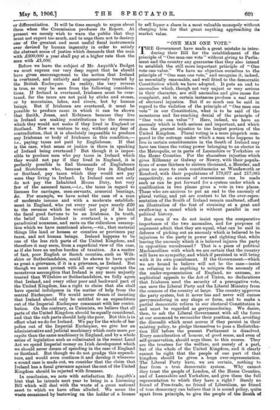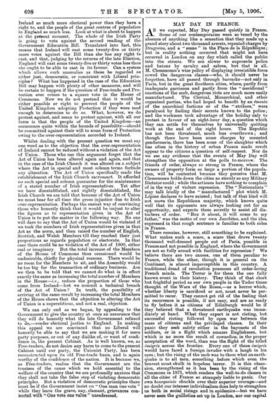"ONE MAN ONE VOTE."
THE Government have made a great mistake in intro- ducing their Bill for the establishment of the principle of "One man one vote" without giving to Parlia- ment and the country any guarantee that they also intend to establish the still more important principle of "One vote one value." We have no objection ourselves to the principle of "One man one vote," and recognise it, indeed, as essentially reasonable, and well fitted to the democratic Constitution which we have adopted. It puts an end to anomalies which, though not very unjust or very serious in their character, are still anomalies and give cause for complaint, and in certain instances produce a real sense of electoral injustice. But if so much can be said in regard to the violation of the principle of "One man one vote" in our Constitution, what is to be said of the monstrous and far-reaching denial of the principle of "One vote one value " ? Here, indeed, we have an anomaly which is both serious and important, and which does the gravest injustice to tne largest portion of the United Kingdom. Plural voting is a mere pinprick com- pared to the outrage under which a man who happens to live in certain constituencies in the South of Ireland may have ten times the voting power belonging to an elector in the Metropolis, or in parts of Lancashire or Yorkshire or the Home Counties. For the shameless injustice which gives Kilkenny or Galway or Newry, with their popula- tions of some thirteen to sixteen thousand, a Member, and gives no more to such constituencies as Wandsworth or Romford, with their populations of 179,877 and 217,085 respectively, no excuses of convenience can be made such as can be put forward for a system under which a qualification in two places gives a vote in two places. Those who are anxious to put an end to the anomaly of plural voting, and yet are content to let the over-repre- sentation of the South of Ireland remain unaltered, afford an illustration of the feat of straining at a gnat and swallowing a camel which is without parallel in our political history.
But even if we do not insist upon the comparative importance of the two anomalies, and for purposes of argument admit that they are equal, what can be said in defence of picking out an anomaly which is believed to be injurious to the party in power and righting that, while leaving the anomaly which it is believed injures the party in opposition unredressed ? That is a. piece of political Ma,chiavellism with which we are certain that the country will have no sympathy, and which if persisted in will.bring with it its own punishment. If the Government—which we are bound to believe will not be the case—insist on refusing to do anything to mitigate the anomaly of the under-representation of England, no excuses, no sophistical appeals to the Act of Union, no declarations that Irishmen need the security of a prerogative vote, can save the Liberal Party and the Liberal Ministry from the censure of the country at large. The country approves the party system, but it never has and never will excuse gerrymandering in any shape or form, and to make a partial democratic reform in our electoral Constitution is and must be regarded as gerrymandering. We desire, then, to ask the Liberal Government with all the force at our command to reconsider their position, and, avoiding the discredit which must accrue if they persist in their existing policy, to pledge themselves to pass a Redistribu- tion Bill before the present Parliament is dissolved. Every consideration of honour, of good sense, and even of self-preservation, should urge them to this course. They are the trustees for the welfare, not merely of a part, but of the whole of the United Kingdom, and it clearly cannot be right that the people of one part of that kingdom should be given a huge over-representation. The Liberal Party have, we are certain, nothing to fear from a true democratic system. Why cannot they trust the people of London, of the Home Counties, and of Lancashire and Yorkshire, and give them the full representation to which they have a right ? Surely no friend of Free-trade, no friend of Liberalism, no friend of true democracy can believe that it is sound policy, quite apart from principle, to give the people of the South of Ireland so much more electoral power than they have a right to, and the people of the great centres of population in EnglAnd so much less. Look at what is about to happen at the present moment. The whole of the Irish Party is going to vote against the second reading of the Government Education Bill. Translated into fact, this means that Ireland will cast some twenty-five or thirty more votes against the Bill than she has any right to cast, and that, judging by the returns of the late Election, England will cast some twenty-five or thirty votes less than she ought to be able to cast in its favour. Can a system which allows such anomalies as these be regarded as either just, democratic, or consistent with Liberal prin- ciples ? What has happened in the case of the Education Bill may happen with plenty of other measures, and will be certain to happen if the question of Free-trade and Pro- tection ever comes to a square vote in the House of Commons. Now we do not pretend that it would be either possible or right to prevent the people of the United Kingdom adopting Protection if they were mad enough to determine to do so. What, however, we do protest against, and mean to protest against, with all our force is that the people of the United Kingdom—an occurrence quite within the bounds of possibility—should be committed against their will to some form of Protection owing to the over-representation accorded to Ireland.
Whilst dealing with the present question we must say one word as to the objection that the over-representation of Ireland cannot be reduced without a violation of the Act of Union. Those who use this argument forget that the Act of Union has been altered again and again, and that in the case of the Irish Church it was altered on a subject where the Act in special and most solemn terms forbade any alteration. The Act of Union specifically made the establishment of the Irish Church sacrosanct. It afforded no such special and solemn guarantee for the maintenance of a stated number of Irish representatives. Yet after we have disestablished, and rightly disestablished, the Irish Church we are told that because of the Act of Union we must bear for all time the gross injustice due to Irish over-representation. Perhaps the easiest way of convincing those who honestly think that it would be unjust to alter the figures as to representation given in the. Act of Union is to put the matter in the following way. No one will dare to say that the Act of Union would be violated if we took the numbers of Irish representatives given in that Act as the norm, and then raised the number of English, Scottish, and Welsh Members till they reached their just proportions as regards population or electorate. In that case there could be no violation of the Act of 1800, either real or imaginary. But the total increase of the Members of the House of Commons thus occasioned would be undesirable, chiefly for physical reasons. There would be no room for the Members to sit, and the Assembly would be too big for the transaction of ordinary business. Are we then to be told that we cannot do what is in effect exactly the same as increasing the total number of Members in the House—i.e., reduce the proportion of those who come from Ireland—lest we commit a technical breach of the Act of Union ? In truth, the possibility of arriving at the same result by increasing the total Members of the House shows that the objection to altering the Act of Union is a superstitious, and not a real, objection.
We can only end as we began, by appealing to the Government to give the country at once an assurance that they will do honestly what the late Government refused to do,—render electoral justice to England. In making this appeal we are convinced that no Liberal will honestly be able to say that we are making it for mere party purposes, or out of any dislike of, or want of confi- dence in, the present Cabinet. As is well known, we, as Free-traders, do not desire any harm to come to the present Cabinet until our party, the Unionist Party, has been reconstructed upon its old Free-trade basis, and is again worthy of the confidence of the nation. It is because we, as Free-traders, realise that the Government are the trustees of the cause which we hold essential to the welfare of the country that we are profoundly anxious that they shall not take the false step of violating democratic principles. But a violation of democratic principles there must be if the Government insist on "One man one vote" while they leave the grave, nay, clamant, grievances con- necthd-with'"One vote one value" unrearessed.









































 Previous page
Previous page